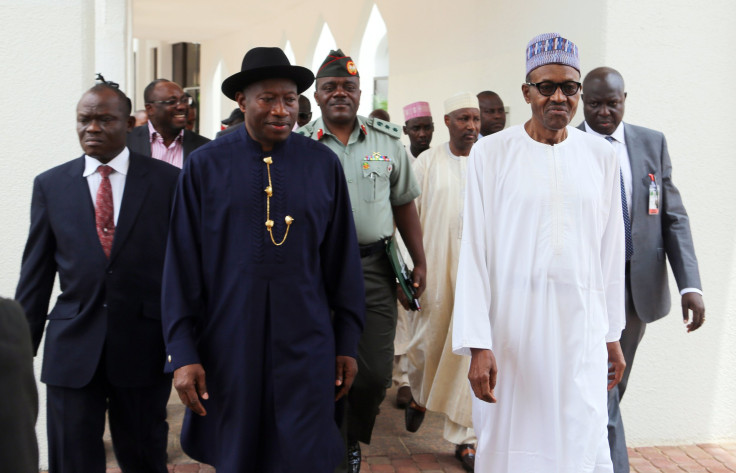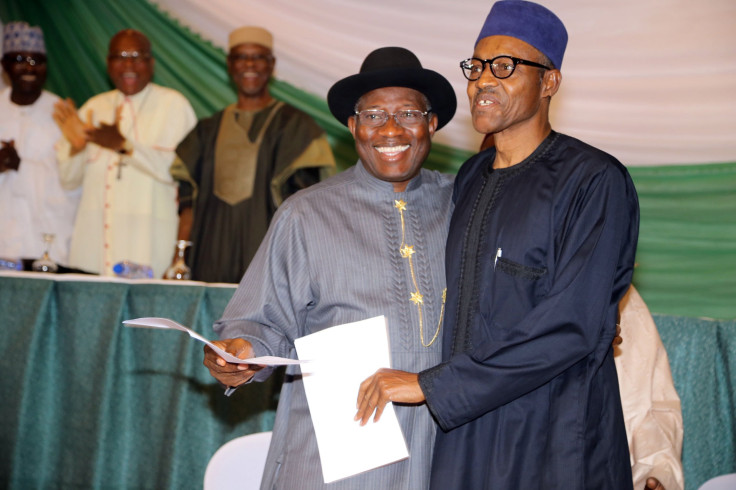In Nigeria, Goodluck Jonathan's Party Calls Buhari Government 'Undemocratic' Amid Corruption Probe

As Nigerian President Muhammadu Buhari begins investigating previous administrations for corruption, the country's main opposition faction, the Peoples Democratic Party, has accused the president and his ruling party of being undemocratic for criticizing a peace committee that had urged caution over the investigation. The accusations marked the latest spat between the two rival parties months after Nigeria witnessed its first peaceful transfer of power.
The National Peace Committee, which brokered a peace deal signed by the two political parties prior to the March 28 presidential election, called a meeting between Buhari's administration and the Peoples Democratic Party at the presidential villa in Abuja last week. The nongovernmental committee, led by former military head of state Abdulsalami Abubakar, cautioned Buhari against pursing allegations of graft, voter intimidation and ballot rigging against former President Goodluck Jonathan and his Peoples Democratic Party-led government in an effort to keep the peace between the two parties. But the ruling All Progressives Congress swiftly dismissed the committee's suggestion, angering the opposition, according to local media reports.
“The intolerance of the [All Progressives Congress] and the glaring insensitivity of this government, in spite of the outcries of well-meaning Nigerians against their undemocratic leanings, raise fears about the future of our democracy and the general health of our dear nation,” Peoples Democratic Party spokesman Olisa Metuh said in a statement Sunday, obtained by Nigerian newspaper Premium Times. “How can we begin to explain the venom and disparagement with which the [All Progressives Congress] has been attacking our highly revered national leaders in the National Peace Committee ... for daring to counsel Buhari’s government on some observed undemocratic tendencies and processes. ”
The Peoples Democratic Party further accused Buhari’s government of “incessant violation of sections of the nation’s constitution, a development that has become a huge threat to democracy and the stability of the nation.” The opposition alleged the president’s failure to appoint new national commissioners and a permanent chairman of Nigeria’s election commission could be part of a scheme to rig the upcoming gubernatorial elections in Kogi and Bayelsa states, areas that are strongholds of the Peoples Democratic Party.
“Why should President Buhari wait to be urged before he upholds his responsibility of forwarding replacements to the Senate for confirmation so as to enable the commission effectively [to] carry out its constitutional responsibilities to the nation?” Metuh asked in the statement Sunday, according to Premium Times. “Could this be a ploy by the [All Progressives Congress]-led government to use a decapitated [Independent National Election Commission] to conduct the forthcoming governorship elections in Kogi and Bayelsa to pave way for their planned ‘capture’ of the two [Peoples Democratic Party] states?”

It was the first time the National Peace Committee met with the two rival parties since the 2015 general elections in which Buhari and his All Progressives Congress won majority rule, Vanguard Newspapers reported.
Following the meeting, Mathew Hassan Kukah, committee chairman and the bishop of Sokoto Catholic Diocese, said there were concerns over Buhari's anti-corruption inquiry into Jonathan's administration and its potentially undemocratic process. Kukah noted the committee had called the meeting on its own accord, and Jonathan never asked it to intervene.
“I think what we are concerned about is process. It is no longer a military regime and, under our existing laws, everybody is innocent until proven guilty,” Kukah said on behalf of the National Peace Committee last week, according to Nigerian news site Naij.com . “Again, our own commitment is not to intimidate or fight anybody. The former president’s commitment and what he did still remains spectacular and I think that President Buhari himself appreciates that.”
However, the ruling All Progressives Congress criticized the suggestion in a statement issued after the meeting, saying the nongovernmental committee had put pressure on Buhari to stall the investigation.
"President Buhari has promised to break the vicious cycle of corruption that has held Nigeria down. How can he do that if he allows those who have looted the treasury to escape justice, and then use their ill-gotten wealth to fight the government? How can he do that if he turns a blind eye to the monumental cases of corruption in all sectors? We know that fighting corruption in a society where the cankerworm has eaten deep into its fabric will not be easy. We know that corruption will always fight back,” the News Agency of Nigeria quoted All Progressives Congress spokesman Alhaji Lai as saying in the statement last week. “Therefore, those who are shouting themselves hoarse by saying the Buhari administration’s fight against corruption is selective or is a distraction, are only seeking to sabotage the epic battle.”
Buhari, a former military ruler, defeated Jonathan in the presidential poll with promises to fight corruption in the West African nation. Since taking office in May, the newly elected leader has made moves to keep his promise to drive out corruption from previous governments and hold perpetrators accountable.
© Copyright IBTimes 2025. All rights reserved.





















